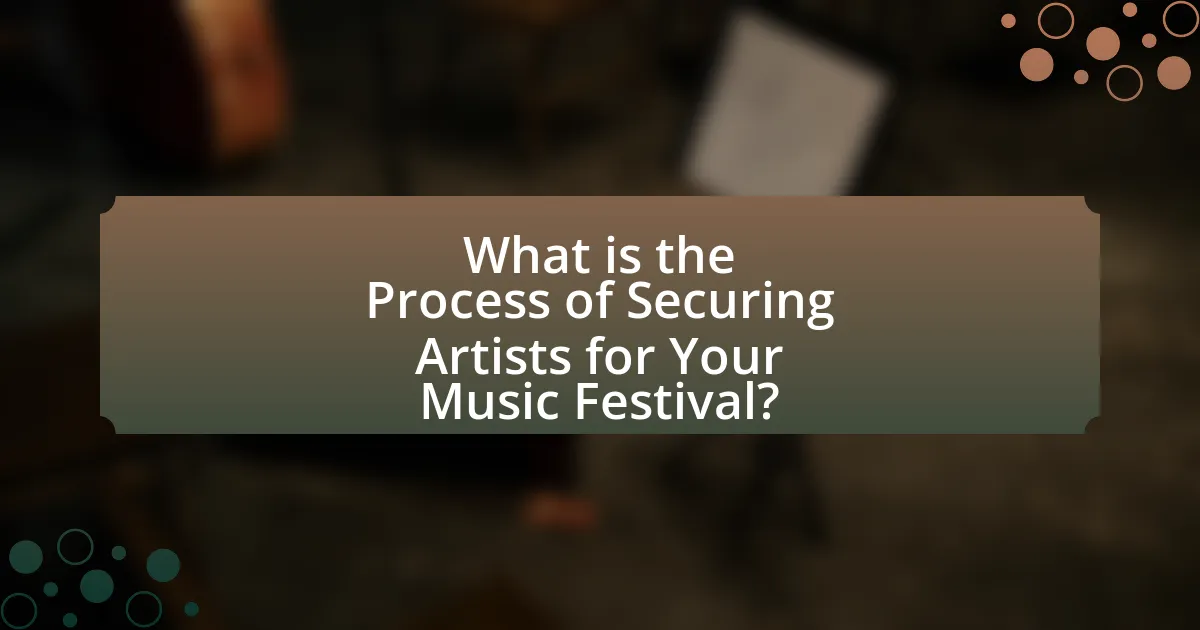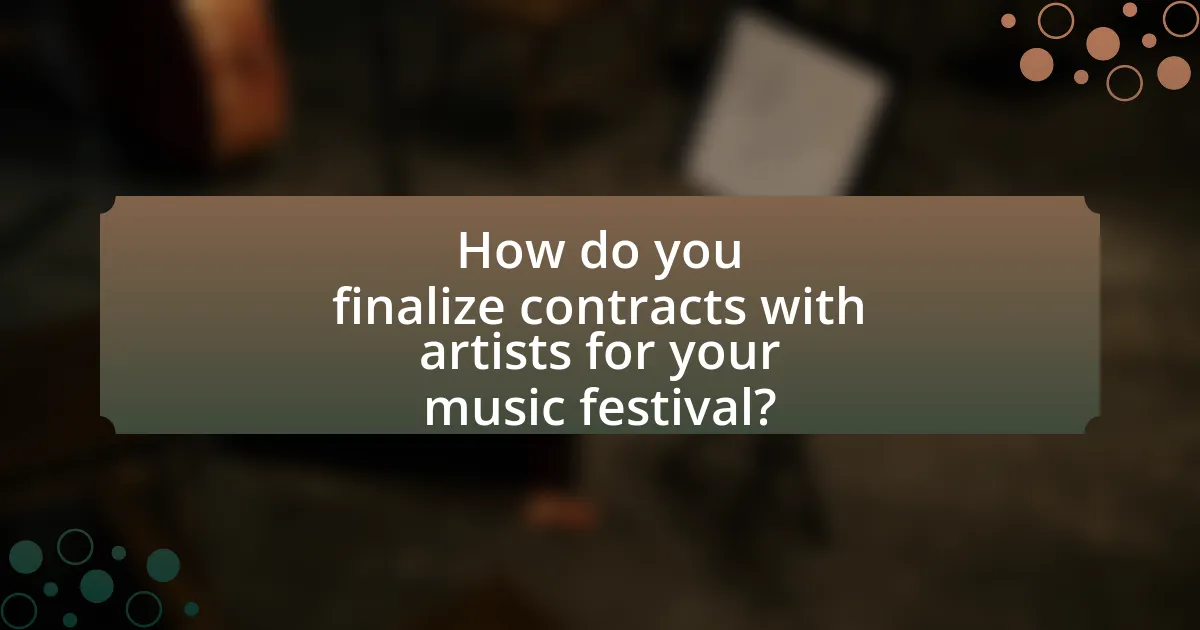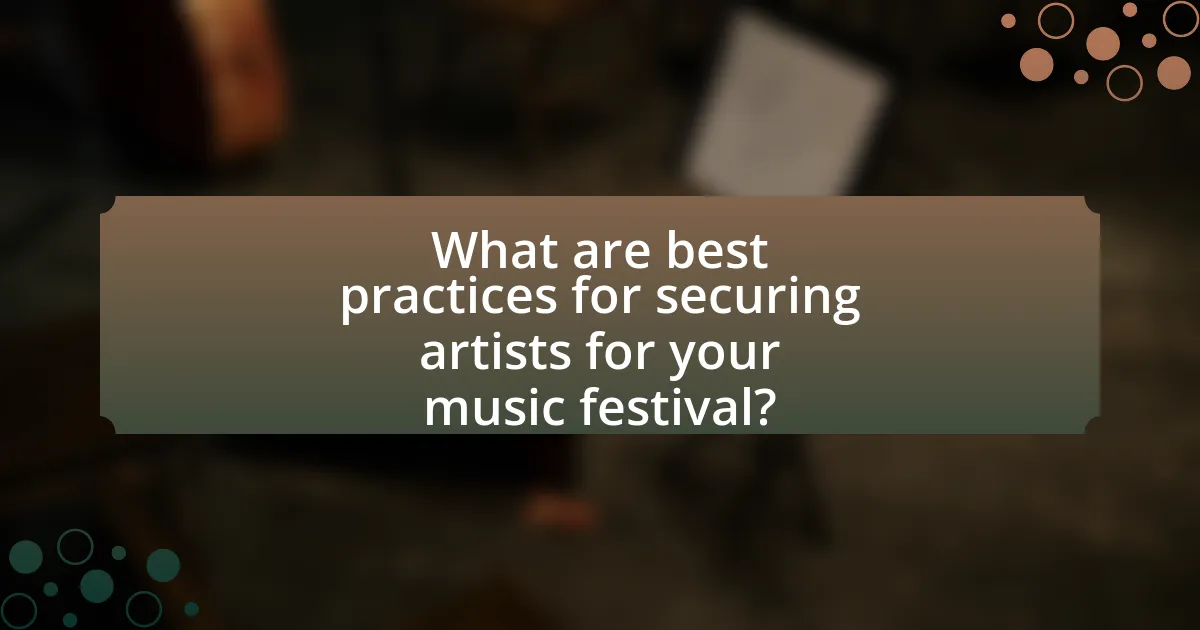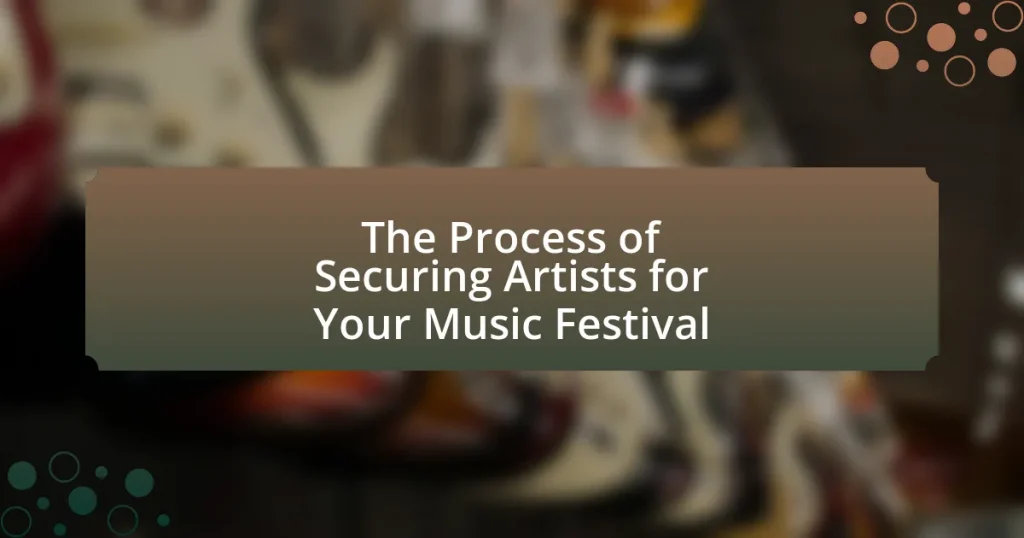The main entity of the article is the process of securing artists for music festivals. The article outlines the essential steps involved in this process, including identifying the target audience, establishing a budget, researching potential artists, and negotiating contracts. It emphasizes the importance of aligning artist selections with audience demographics and festival themes to enhance ticket sales and overall success. Additionally, the article discusses logistical considerations, effective communication strategies, and best practices for managing artist relationships and contracts, providing a comprehensive guide for festival organizers.

What is the Process of Securing Artists for Your Music Festival?
The process of securing artists for a music festival involves several key steps: identifying the target audience, creating a budget, researching potential artists, reaching out to their management, negotiating contracts, and finalizing agreements. First, festival organizers must define the demographic they wish to attract, which informs the selection of artists. Next, a budget is established to determine how much can be allocated for artist fees.
Following this, organizers research artists who align with the festival’s theme and audience preferences, considering factors such as popularity, genre, and availability. Once potential artists are identified, organizers contact their management teams to gauge interest and availability for the festival dates. This is followed by negotiations regarding performance fees, technical requirements, and other contractual obligations. Finally, once terms are agreed upon, contracts are signed to secure the artists’ participation in the festival. This structured approach ensures that the festival features artists who resonate with the audience while adhering to budgetary constraints.
How do you begin the artist booking process?
To begin the artist booking process, identify the specific artists or genres that align with your music festival’s theme and audience. This initial step involves researching potential artists, considering their popularity, availability, and fit for your event. According to a 2021 survey by Eventbrite, 70% of festival organizers prioritize artist alignment with their audience’s preferences when selecting performers, underscoring the importance of this foundational decision.
What initial considerations should be made before reaching out to artists?
Before reaching out to artists, it is essential to define the festival’s budget and target audience. Establishing a budget ensures that the festival can afford the artists’ fees, which vary widely based on their popularity and market demand. Additionally, identifying the target audience helps in selecting artists whose music aligns with the preferences of potential attendees, thereby increasing ticket sales and overall festival success. Research indicates that festivals that align artist selections with audience demographics see a 20% increase in attendance compared to those that do not.
How do you determine the budget for artist bookings?
To determine the budget for artist bookings, assess the overall festival budget and allocate a specific percentage for talent acquisition, typically ranging from 20% to 40%. This allocation is influenced by factors such as the festival’s scale, expected attendance, and the prominence of the artists being booked. For instance, larger festivals with higher ticket sales can afford to spend more on high-profile artists, while smaller events may need to prioritize emerging talent or local acts to stay within budget constraints. Additionally, market research on artist fees and historical data from similar events can provide insights into realistic pricing, ensuring that the budget aligns with industry standards and audience expectations.
What factors influence the selection of artists for a music festival?
The selection of artists for a music festival is influenced by factors such as audience demographics, genre diversity, artist popularity, budget constraints, and logistical considerations. Audience demographics determine the types of artists that will attract attendees, while genre diversity ensures a broad appeal across different musical tastes. Artist popularity, often measured by streaming numbers and social media presence, impacts ticket sales and overall festival success. Budget constraints dictate which artists can be booked, as higher-profile acts typically demand larger fees. Logistical considerations, including availability, travel arrangements, and stage requirements, also play a crucial role in the selection process.
How does the festival’s theme affect artist selection?
The festival’s theme directly influences artist selection by guiding the type of performances and genres that align with the event’s overall concept. For instance, a festival themed around environmental sustainability may prioritize artists known for their eco-conscious messages or acoustic performances that resonate with nature. This alignment ensures that the artists not only fit the festival’s narrative but also enhance the audience’s experience by creating a cohesive atmosphere that reflects the theme. Additionally, research indicates that thematic consistency can increase audience engagement and satisfaction, as attendees often seek experiences that resonate with their values and interests.
What role does audience demographics play in choosing artists?
Audience demographics significantly influence the selection of artists for music festivals. Understanding the age, gender, cultural background, and preferences of the target audience helps organizers choose artists who resonate with attendees, thereby enhancing ticket sales and overall festival experience. For instance, a festival aimed at a younger demographic may prioritize popular genres like hip-hop or electronic dance music, while a festival targeting an older audience might focus on classic rock or jazz artists. Research indicates that aligning artist choices with audience demographics can lead to increased engagement; a study by the International Journal of Arts Management found that festivals that cater to their audience’s demographic preferences see a 30% increase in attendance.
What are the steps involved in contacting and negotiating with artists?
The steps involved in contacting and negotiating with artists include researching potential artists, reaching out with a professional proposal, discussing terms and conditions, and finalizing the agreement. First, identify artists whose style aligns with the festival’s theme and audience. Next, initiate contact through email or social media, presenting a clear proposal that outlines the festival details, performance expectations, and compensation. During negotiations, discuss specific terms such as performance fees, technical requirements, and accommodations. Finally, once both parties agree on the terms, draft and sign a contract to formalize the arrangement. This structured approach ensures clarity and professionalism throughout the process.
How do you effectively reach out to potential artists?
To effectively reach out to potential artists, utilize personalized communication strategies that highlight mutual benefits. Research each artist’s work and tailor your outreach message to reflect an understanding of their style and achievements, which increases the likelihood of a positive response. According to a study by the University of Southern California, personalized outreach can improve engagement rates by up to 50%. Additionally, leveraging social media platforms to connect and engage with artists can create a more approachable atmosphere, fostering relationships that lead to successful collaborations.
What negotiation strategies can be employed to secure artists?
To secure artists, effective negotiation strategies include establishing clear communication, offering competitive compensation, and building strong relationships. Clear communication ensures that both parties understand expectations and requirements, which minimizes misunderstandings. Offering competitive compensation is crucial, as artists often have specific financial expectations based on their market value and previous engagements. Building strong relationships through networking and maintaining a positive reputation in the industry can lead to more favorable negotiations, as artists are more likely to collaborate with promoters they trust. These strategies are supported by industry practices where successful festivals prioritize artist satisfaction and engagement, leading to repeat performances and positive word-of-mouth.

How do you finalize contracts with artists for your music festival?
To finalize contracts with artists for a music festival, the festival organizers must negotiate terms, including performance fees, set times, and technical requirements, followed by drafting a formal agreement. This process typically involves direct communication with the artist’s management to ensure all parties agree on the specifics, which may include clauses related to cancellation policies and rider requests. Once both sides reach a consensus, the contract is signed, often requiring a deposit to secure the booking. This method is validated by industry standards, where clear contractual agreements are essential for protecting the interests of both the festival and the artists involved.
What key elements should be included in artist contracts?
Artist contracts should include key elements such as scope of work, payment terms, performance details, rights and ownership, cancellation policies, and liability clauses. The scope of work defines the specific services the artist will provide, while payment terms outline the compensation structure, including deposits and final payments. Performance details specify the date, time, and duration of the performance, ensuring clarity on expectations. Rights and ownership clauses address the use of the artist’s image and music, protecting both parties’ intellectual property. Cancellation policies outline the procedures and penalties for canceling the contract, providing security for both the artist and the organizer. Lastly, liability clauses protect against potential legal issues arising from the performance. These elements are essential for creating a comprehensive and enforceable agreement that safeguards the interests of both the artist and the festival organizers.
How do you ensure compliance with legal requirements in contracts?
To ensure compliance with legal requirements in contracts, it is essential to conduct thorough legal reviews and consult with legal professionals. This process involves drafting contracts that adhere to applicable laws, including intellectual property rights, labor laws, and safety regulations specific to music festivals. Legal professionals can provide insights into jurisdictional requirements and help identify potential legal risks. Additionally, implementing a checklist of legal obligations and regularly updating contracts to reflect changes in legislation further reinforces compliance.
What are common pitfalls to avoid in artist agreements?
Common pitfalls to avoid in artist agreements include vague terms, lack of clarity on payment structures, and insufficient detail regarding performance expectations. Vague terms can lead to misunderstandings about the scope of work, while unclear payment structures may result in disputes over compensation. Additionally, failing to specify performance expectations, such as set length and technical requirements, can create logistical issues. According to the American Bar Association, clearly defined agreements help mitigate conflicts and ensure all parties understand their obligations, thereby reinforcing the importance of specificity in artist agreements.
How do you manage artist logistics and requirements?
To manage artist logistics and requirements, establish a detailed plan that includes transportation, accommodation, technical needs, and scheduling. This involves coordinating travel arrangements, booking hotels, and ensuring that all technical specifications for performances are met, such as sound and lighting equipment. For instance, a successful festival like Coachella employs a dedicated logistics team that communicates directly with artists and their management to confirm all details well in advance, ensuring a smooth experience for both the artists and the event organizers.
What are the typical technical and hospitality needs of artists?
Artists typically require specific technical and hospitality needs to perform effectively at events. Technical needs often include high-quality sound systems, appropriate lighting setups, and necessary stage equipment tailored to their performance style. For instance, musicians may need specific instruments, amplifiers, and monitors, while visual artists might require projectors or screens.
Hospitality needs generally encompass comfortable dressing rooms, adequate catering options, and access to essential amenities such as restrooms and showers. According to industry standards, artists often expect a rider that outlines these requirements, ensuring their comfort and ability to perform at their best. Meeting these needs is crucial for successful artist engagement and overall event satisfaction.
How can you coordinate schedules and set times effectively?
To coordinate schedules and set times effectively for a music festival, utilize a centralized scheduling tool that allows all stakeholders to access and update their availability in real-time. This approach ensures transparency and minimizes scheduling conflicts, as evidenced by the successful implementation of tools like Google Calendar and Doodle in event planning, which have been shown to enhance collaboration and efficiency. Additionally, establish clear communication channels among artists, management, and vendors to facilitate timely updates and adjustments, thereby streamlining the overall scheduling process.

What are best practices for securing artists for your music festival?
To secure artists for your music festival effectively, establish clear contracts that outline performance details, payment terms, and rider requirements. Clear contracts prevent misunderstandings and ensure both parties are aligned on expectations. Additionally, research and select artists whose music aligns with your festival’s theme and audience demographics, as this increases ticket sales and enhances the festival experience. Engaging a reputable booking agent can streamline the process, as they have established relationships and negotiation skills that can lead to better deals. According to a 2021 survey by Pollstar, festivals that utilized professional booking agents reported a 30% increase in artist satisfaction and a 25% increase in audience engagement.
How can you build relationships with artists and their representatives?
To build relationships with artists and their representatives, establish clear communication and demonstrate genuine interest in their work. Engaging with artists through social media, attending their performances, and networking at industry events fosters trust and rapport. According to a study by the Music Industry Research Association, personal connections significantly enhance collaboration opportunities, indicating that consistent interaction and support can lead to successful partnerships.
What networking strategies can enhance artist booking success?
Building strong relationships within the music industry enhances artist booking success. Networking strategies such as attending industry events, engaging with booking agents, and leveraging social media platforms are effective. For instance, participating in music festivals and conferences allows artists and promoters to connect directly, fostering relationships that can lead to future bookings. Additionally, collaborating with established artists can increase visibility and credibility, making it easier to secure bookings. According to a survey by Eventbrite, 85% of event organizers find networking essential for securing talent, highlighting the importance of these strategies in the booking process.
How do you maintain communication with artists leading up to the festival?
To maintain communication with artists leading up to the festival, regular updates and check-ins are conducted through various channels such as email, phone calls, and messaging apps. This approach ensures that artists are informed about festival details, schedule changes, and logistical arrangements. For instance, sending weekly emails with updates on the festival lineup and any necessary preparations helps keep artists engaged and informed. Additionally, utilizing project management tools can streamline communication and provide a centralized platform for sharing important documents and timelines, which enhances clarity and reduces misunderstandings.
What common challenges arise in the artist booking process?
Common challenges in the artist booking process include budget constraints, availability of artists, and contract negotiations. Budget constraints often limit the selection of artists, as high-demand performers may exceed financial resources. Availability issues arise when artists have prior commitments or conflicting schedules, making it difficult to secure desired talent. Additionally, contract negotiations can be complex, involving terms related to fees, performance requirements, and technical needs, which can lead to misunderstandings or disputes if not handled carefully. These challenges are frequently encountered by event organizers and can significantly impact the success of a music festival.
How can you address last-minute cancellations or changes?
To address last-minute cancellations or changes, implement a clear communication strategy with artists and have contingency plans in place. Establishing open lines of communication allows for timely updates and adjustments, while contingency plans, such as having backup artists or flexible scheduling, ensure that the festival can proceed smoothly despite unexpected changes. Research indicates that festivals with robust contingency plans experience less disruption, maintaining audience satisfaction and operational efficiency.
What strategies can mitigate budget constraints during artist bookings?
To mitigate budget constraints during artist bookings, event organizers can implement strategies such as negotiating flexible payment terms, prioritizing local artists, and leveraging sponsorships. Negotiating flexible payment terms allows organizers to spread costs over time, making it easier to manage cash flow. Prioritizing local artists can significantly reduce travel and accommodation expenses, as they typically incur lower costs compared to international acts. Additionally, leveraging sponsorships can provide financial support, enabling organizers to allocate more funds towards artist fees. According to a study by the Event Marketing Institute, 70% of event organizers reported that sponsorships helped them enhance their budgets, demonstrating the effectiveness of this strategy.
What tips can help ensure a successful artist booking experience?
To ensure a successful artist booking experience, clear communication is essential. Establishing transparent expectations regarding performance details, payment terms, and logistical arrangements fosters trust and minimizes misunderstandings. Additionally, researching the artist’s preferences and past performances can help tailor the experience to their needs, enhancing satisfaction. According to a survey by Eventbrite, 70% of event organizers reported that effective communication significantly improved their booking outcomes. This data underscores the importance of maintaining open lines of dialogue throughout the booking process.
How can you leverage social media to attract artists?
To leverage social media to attract artists, create targeted campaigns that showcase the festival’s unique offerings and engage with artists directly. Utilizing platforms like Instagram and Twitter allows for visual storytelling and real-time interaction, which can highlight the festival’s atmosphere and past performances. According to a 2021 survey by Eventbrite, 70% of artists reported that social media significantly influences their decision to participate in events. By actively promoting artist collaborations, sharing behind-the-scenes content, and using relevant hashtags, you can enhance visibility and appeal to potential performers.
What resources are available for festival organizers to streamline the booking process?
Festival organizers can utilize booking platforms, artist management software, and contract templates to streamline the booking process. Booking platforms like Bandsintown and Sonicbids allow organizers to connect with artists efficiently, while artist management software such as Gigwell helps manage communications and logistics. Additionally, using standardized contract templates can expedite negotiations and ensure compliance with legal requirements. These resources collectively enhance efficiency, reduce administrative burdens, and facilitate smoother interactions between organizers and artists.
